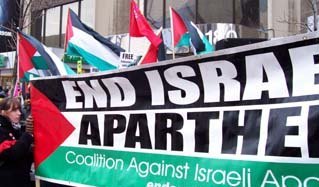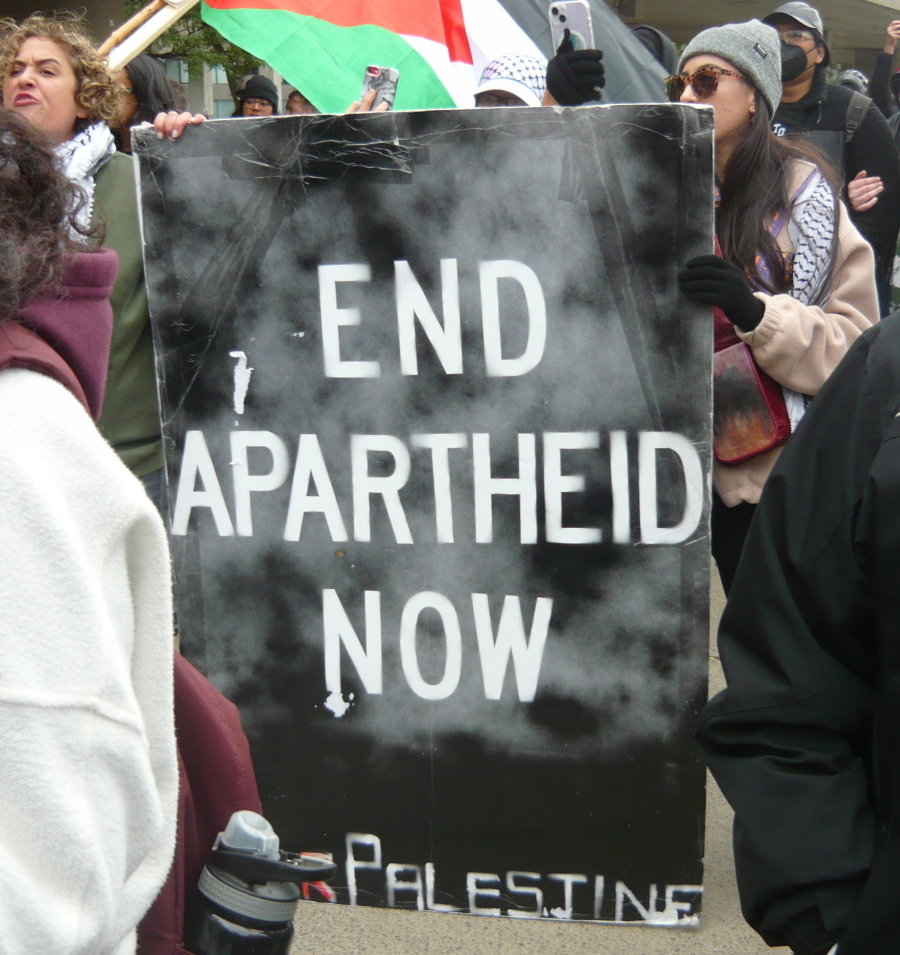Evidence that Israel Is an Apartheid State
 While Canada attempts to criminalize everyone who publicly defends the
conclusion that Israel is an Apartheid State, many human rights
organizations, academics, members of past Israeli governments,
personalities -- including Nelson Mandela and Desmond Tutu -- and many
others have stood with the people of Palestine to provide evidence that
Israel is in fact an apartheid state as defined in international law.
While Canada attempts to criminalize everyone who publicly defends the
conclusion that Israel is an Apartheid State, many human rights
organizations, academics, members of past Israeli governments,
personalities -- including Nelson Mandela and Desmond Tutu -- and many
others have stood with the people of Palestine to provide evidence that
Israel is in fact an apartheid state as defined in international law.
Israel has never recognized the armistice lines of 1949, and considers historic Palestine a single jurisdiction between the river and the sea (the Jordan River to the Mediterranean). Israel applies different legal systems to the people that live "between the river and the sea." It uses warfare against the people of Gaza, martial law in the West Bank, administrative and civil law in East Jerusalem and civil law within Israel to rule Palestinians and deprive them of rights. All of the systems are based on the assertion that only the Jewish people have a right to national self-determination within historic Palestine. They all have a common aim of Jewish supremacy and advancing the aim of seizing more and more land for exclusive Jewish land and settlement.
The Legal Center for Arab Minority Rights has a database of over 60 laws that demonstrates how Israel either explicitly violates the rights of Palestinian citizens or does it by disparate impact.
The Israeli human rights organization B'Tselem identifies four broad areas where Israel imposes an apartheid regime -- land, citizenship, freedom of movement, and political participation.
Citizenship and the Right to Return
The Law of Return of 1950 allows any Jewish person, defined as anyone with one Jewish grandparent, the right to return to Israel -- the right to move to Israel and automatically become a citizen of Israel. The spouse of any Jewish person also has that right unless they are Palestinian. The law denies Palestinian refugees and their descendants legal status, the right to return, and all other rights in their homeland, even if they, their parents, or their grandparents were born and lived there, and even if they were forcibly driven from their homes. It defines Palestinians present in Israel, who make up about 20 per cent of the population, as Israeli citizens without a nationality. Residents of East Jerusalem, which Israel occupied in 1967, are considered "permanent residents," do not hold Israeli passports and their status can be revoked if they are living abroad. Palestinians who marry Israelis are denied status within pre-1967 borders. They can obtain temporary, two-year residence permits, which can be revoked at any time, forcing a family to either live apart or emigrate. This and other laws including the Nationality Law of 1952 were aimed at preventing a return of Palestinians who were the victims of ethnic cleansing in 1948.[1]
Other laws which further establish who can live within the state of Israel (pre-1967 borders) and which deny Palestinians the right to return and live in their homeland include the Absentees' Property Law of 1950; Entry into Israel Law of 1952; World Zionist Organization -- Jewish Agency (Status) Law of 1952; Land Acquisition Law (Validation of Acts and Compensation) of 1953; and Basic Law: Israel Lands of 1960.
The Israeli Nation State Law lays claim to all of historic Palestine as the "homeland of the Jewish people" in which Jewish supremacy must be established and maintained. The law, enacted in 2018, defines Israel as the nation state of the Jewish people, and adds that "fulfilling the right to national self-determination in the state of Israel is unique to the Jewish people." The law also stipulates the protection of illegal Jewish settlement as a national value and that "Israel will labour to encourage and promote its establishment and development." This law declares that the annexation by force of Palestinian land is a protected right for Jews. It also downgraded Arabic from an official state language to one with "special status." The law was upheld by the Supreme Court in 2021.
"The Nation-State Law is intended to end the aspirations of the Palestinian people more generally. The law establishes the "Land of Israel," that is, Palestine from river to the sea, as territory open to Jewish self-determination. All parts of Palestine are in principle a frontier for expansion, annexation, and the imposition of Israeli sovereignty."
For further information on the Nation State Law click here.
Land
Israel practices a policy of "Judaizing" historic Palestine. This is a continuous process practiced with respect to land within pre-1967 borders and applied to Palestinians in the Occupied Territories since 1967. "Judaizing" takes the form of expansion of illegal settlements, expropriation of land, house demolitions, confiscation and destruction of property, and forced displacement which are all illegal under the Fourth Geneva Convention.

"Where Palestinians live, on the other hand, is crucial. The Israeli regime has divided historic Palestine into units that it defines and governs differently, according Palestinians different rights in each. This division is relevant to Palestinians only. The geographic space, which is contiguous for Jews, is a fragmented mosaic for Palestinians:"
The Absentee Property Law mandates expropriation of land belonging to Palestinians who were expelled or fled in 1948. This land has been used exclusively to build communities for Jewish citizens, with not a single community for Palestinians. Communities can legally establish "admission committees" to refuse all Palestinian applicants from living in their communities on the grounds of "cultural incompatibility."
Administrative law (regulations) are used to prevent Palestinians from accessing land for their growing population. A separate planning system for Palestinians in the West Bank is designed to prevent construction and development. Land is declared state land, a firing zone, a nature reserve or a national park to prevent Palestinians from building on the land, while illegal settlements proliferate.
Freedom of Movement
Israeli citizens can leave and reenter the country at any time, and have freedom of movement within the entire area controlled by Israel. Palestinian subjects, on the other hand, are strictly regulated and require a special Israeli permit to travel between the units which Israel has established and sometimes inside them, and to travel abroad. The process for receiving a travel permit is both lengthy and arbitrary.
Gazans are imprisoned within Gaza, and except under exceptional circumstances, no one can enter or leave. Israel controls all routes between what have become Palestinian enclaves in the West Bank. Israel can close off access to villages, block roads and stop passage through checkpoints at will. Palestinians are barred from accessing their land, including farmland, between the apartheid wall and the pre-1967 border, subject to the same permit regime.
Palestinians are not permitted to enter the illegal Israeli settlements.
The UN Office for the Coordination of Humanitarian Affairs (OCHA) has documented 645 physical obstacles to movement in the West Bank including checkpoints, roadblocks, road gates, earth walls and mounds, road barriers and trenches. Many checkpoints are fortified with metal detectors, surveillance cameras and facial recognition technology, and with facilities for detention and interrogation. A checkpoint can be closed at any moment. OCHA has assessed more than half of the obstacles to have a severe impact on Palestinians by preventing or restricting access and movement to main roads, urban centres, services, and agricultural areas.
Denial of Human Rights to Freedom of Speech,
Association and Political Participation
Collective Rights: The roughly 5 million Palestinians who live in the occupied territories, including East Jerusalem, live under Israeli rule. Collective political rights are reserved for Jews and denied to Palestinians, who constitute more than half of the population in what the law calls "Land of Israel" -- that is, historic Palestine. Palestinians governed by the laws of the State of Israel are by law considered to have no nationality, and no collective rights as Palestinians. The Interior Minister can strip citizens of their citizenship if convicted of acts that amount to "breach of allegiance to the state." The law has exclusively been applied to Palestinians.
In the West Bank, demonstrations are illegal, and political activity is effectively illegal. The United Nations reports that since 1967, when Israel occupied East Jerusalem, the Gaza Strip and the West Bank, 1 million -- or one in five Palestinians -- has been arrested and charged under the 1,600 military orders that control every aspect of their lives under military occupation.
There were about 5,200 Palestinians in Israeli prisons prior to October 7. There are now more than 10,000 as of October 21, including 4,000 workers from Gaza who are being held in military bases, and 1,070 Palestinians arrested in the West Bank and East Jerusalem. Palestinians can be held indefinitely under administrative detention without charges or a trial. If brought to trial, prosecution takes place in military courts, while settlers in the West Bank are under civil law, although in reality they are free to commit crimes against Palestinians with impunity.
The director of the Palestinian Authority Detainees Affairs Commission reports that prisoners are subjected to starvation and thirst, denied medical attention and medicine, and water and electricity are cut off. Torture and beating of Palestinian prisoners is well documented.
Palestinian citizens of Israel are being arrested, fired and suspended from their jobs, and expelled from school for expressing solidarity with Gaza, on a variety of charges ranging from "publication of incitement" and "behaviour that could harm public order," to "support for terrorist organizations." All demonstrations in solidarity with Gaza are banned.
Expulsion Law: Palestinians within Israel can run for seats in the Knesset. However, a majority of 90 Knesset members can remove a serving member of the Knesset on the following three grounds, as enumerated in Section 7A of the Basic Law -- The Knesset: (1) denial of the existence of Israel as a Jewish and democratic state; (2) incitement to racism; and (3) support for armed struggle of an enemy state or a terrorist organization against Israel. Political parties can also be banned from participating in elections by the Elections Commissioner on the basis of this law.
Disparate Impact
The following are examples of disparate impact. A landlord can refuse to rent to anyone who has not served in the army, which Palestinians do not, and jobs can be denied on the same basis. There are Palestinian towns within Israel whose existence Israel does not recognize and to which it provides no services whatsoever -- no water supply, no garbage collection, no parks and playgrounds, and where the people live in abject poverty. There are many more.
The laws, practices and organized violence speak for themselves. They enshrine in law the supremacy of Jewish people and demonstrate that Israel more than meets the criteria as defined in international law to conclude that it is an apartheid state.
Human Rights Organizations that Concluded Israel Is an Apartheid State
The following human rights organizations have concluded that Israeli law and practices constitute apartheid as defined in international law. This list may not be comprehensive.
Adalah -- The Legal Centre for Arab Minority Rights in Israel
Amnesty International
B'Tselem (Israeli human rights organization)
Centre for Human Rights Dialogue
Democracy for the Arab World Now (DAWN)
Human Rights Watch
International Commission of Jurists
International Federation for Human Rights
South African Human Sciences Research Council
UN Special Rapporteur for Human Rights in the Occupied
Palestinian Territories, Michael Lynk
Yesh Din (Israeli human rights organization)
This article was published in

Volume 53 Number 23 - November 2023
Article Link:
https://cpcml.ca/Tmlm2023/Articles/MS532316.HTM
Website: www.cpcml.ca Email: editor@cpcml.ca

